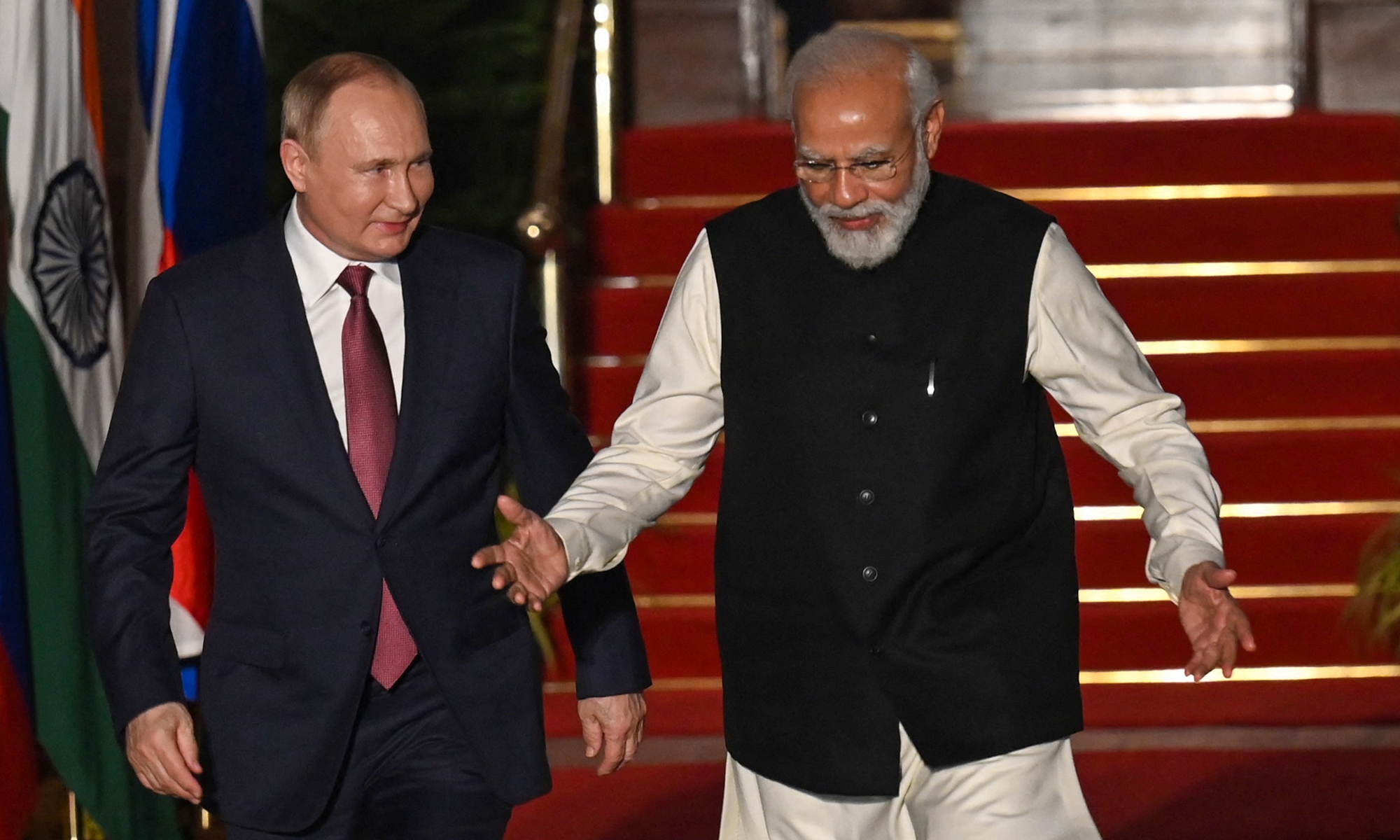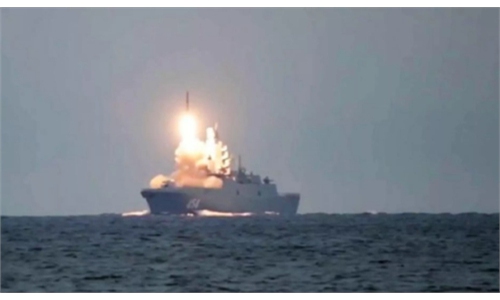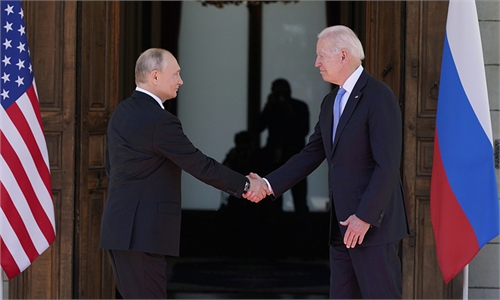Russia, India eye finalizing S-400 deal as Putin visits Modi
Move highlights ‘unbridgeable gap between Delhi, Washington’

India's Prime Minister Narendra Modi (right) greets Russian President Vladimir Putin before a meeting at Hyderabad House in New Delhi on December 6, 2021. Photo: AFP
India is expected to move forward with the delivery of a Russian S-400 missile defense system despite possible US sanctions as Russian President Vladimir Putin and Indian Prime Minister Narendra Modi met on Monday in New Delhi. According to Chinese observers, this reflects India's growing uncertainty and confusion over its pro-US policy while highlighting the unbridgeable gap between India and the US, as the latter wishfully attempts to force India to completely cut off its tradition of non-alignment on national security and turn it into a vassal of its China policy in the Indo-Pacific region.
Some Indian media outlets reporting the meeting hyped the fact that the Russian weapons system could help India counter China in border areas, with the aim of driving a wedge between China and Russia, but Chinese observers called it a "low ploy" and said that in military terms, the Russian weapons system will not give India an advantage with China, and the high confidence in China-Russia relations cannot be stirred up by just a few reports.
Putin arrived in New Delhi on Monday afternoon for the first in-person meeting with Modi since November 2019, and is scheduled to hand over the model of an S-400 air defense system to Modi, Indian media reported.
The S-400 deal between Russia and India was reached in 2018, and Russia recently started delivering the S-400 to India, according to media reports.
The two countries are also expected to ink major deals on production of AK-203 assault rifles in India, and deepen cooperation in defense, trade, space, technology, energy and culture, the Hindustan Times reported.
Ahead of Monday evening's summit, India and Russia held their first 2+2 format dialogue in New Delhi between their defense and foreign ministers. Currently, India only has this arrangement with fellow Quad members.
Indian Defense Minister Rajnath Singh said on Twitter on Monday that the two countries signed a number of agreements, contracts and protocols pertaining to small arms and military cooperation, and added that India deeply appreciated Russia's strong support. "We hope that our cooperation will bring peace, prosperity and stability to the entire region," he tweeted.
India's strengthened defense cooperation with Russia and purchase of its S-400 missile system came after the US asked its partners to stay away from Russian military equipment to avoid possible sanctions under the Countering America's Adversaries Through Sanctions Act (CAATSA). The US has sanctioned Turkey over purchase of the S-400 under CAATSA.
On Putin's visit to India, Chinese analysts said it's the US that was most anxious, as it faced an awkward dilemma on whether to sanction India, which would lead to failure in its attempt to court India to contain China, or waive the sanction and lose the trust of its allies due to flip-flopping.
Chinese analysts said the nature of India-US relations was one of scratching each other's backs and that the gap between them was unbridgeable.
The US wanted India to follow it without conditions, but India will not tie itself to the US chariot to sacrifice itself purely for the US, especially on its interests concerning military and national security, Lan Jianxue, director of the Department for Asia-Pacific Studies at China Institute of International Studies, told the Global Times on Monday.
The Hindustan Times reported that against the backdrop of US threats to impose sanctions on India, an Indian official said India follows a policy of strategic autonomy when it comes to defense procurements and national security interests.
India's expanded cooperation with Russia also came amid India-Russia relations being undermined due to the US' Indo-Pacific strategy, and India has tried to rebalance its relations with major powers, Lan said, noting that India is growing uncertain and confused about its pro-US path and is trying to reach out to Russia to give itself some leeway in managing major power relations.
Experts said that India knew it could not get any tangible benefits from the US, and the US attempt to force it to end its nonalignment tradition and side with it was just wishful thinking.
Apart from trying to lure India with "values," the US has not given India any real preferential policies on bilateral trade or any discounts on arms sales, but has instead ignored India's development rights and demanded more climate change commitments from the country, according to experts.
Driving a wedge between China, Russia
Several Indian media outlets boasted about Russia's relations with India, calling Putin's visit "power packed," and at the same time tried to drive a wedge between China and Russia, as they believe the delivery of S-400 systems could help India counter China.
Some Western media also claimed Putin's visit came in response to speculation that India-Russia relations were fraying due to Russia's closeness with China.
Song Zhongping, a Chinese military expert and TV commentator, told the Global Times on Monday that China has been in possession of the S-400 missile systems for a long time and was familiar with its capabilities, and is capable of neutralizing India's threat posed by its purchased S-400.
India has limited sustainable combat capability, as it relies on purchasing weapons, but China has adopted an independent system on its air defense missile system, which means Chinese military's logistics support capacity and supply capacity are stronger than India's, Song said.
Indian media's low ploy was aimed at pacifying the US by making out that its relations with Russia served the US' purpose of countering China, and the belief that Russia working with India means weakening relations with China is rather superficial, said Li Haidong, a professor at the Institute of International Relations of the China Foreign Affairs University.
Experts said Russia and India have maintained close relations since the Cold War, and India was Russia's important arms sales market, adding that Putin's visit was just a routine one, and did not target China.
The Economic Times said that Putin and Modi's meeting was an annual summit, as the two countries have a mechanism in place for both leaders to meet annually to review ties. The summit was postponed last year due to COVID-19.
Experts stressed that some media outlets harbor the illusion that they can sow discord between China and Russia through a few reports, as the China-Russia relationship was not a temporary one aimed at withstanding pressure, but was unbreakable with true ideas held by the two countries for a major power relationship and their long-term fundamental interests.
China, Russia and India could better balance and maintain the security of the Indo-Pacific region and reach a consensus in maintaining global strategic stability, experts said, noting that their positive interaction was significant to the strategic blueprint of Eurasia.
But they warned that if India continued with its pro-US policy, it could aggravate the regional imbalance and jeopardize relations between the three countries.




